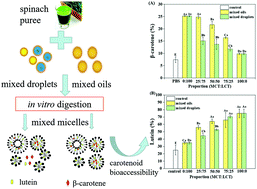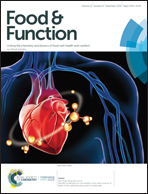Improvement of carotenoid bioaccessibility from spinach by co-ingesting with excipient nanoemulsions: impact of the oil phase composition
Abstract
Many of the carotenoids found naturally in fruits and vegetables are beneficial to human health, but they often have low oral bioavailability because of their high hydrophobicity. In this study, the effects of varying the composition of the oil phase of excipient nanoemulsions on carotenoid bioaccessibility from spinach were investigated using a simulated gastrointestinal tract. Nanoemulsions containing different ratios of medium chain triglycerides (MCT) and long chain triglycerides (LCT) were prepared: (i) mixing MCT and LCT oils before homogenization and (ii) mixing MCT droplets with LCT droplets after homogenization. The release of carotenoids from spinach and their solubilization within the mixed micelles formed after lipid digestion depended strongly on the oil phase composition. As expected, carotenoid bioaccessibility was always higher in the presence of excipient nanoemulsions than in their absence. The total free fatty acids released in the small intestine increased as the MCT/LCT ratio increased, which can be attributed to the faster release of shorter chain fatty acids from the oil droplet surfaces during lipid digestion. As the MCT ratio increased, lutein bioaccessibility increased but β-carotene bioaccessibility decreased. This difference was attributed to the ability of the formed mixed micelles to accommodate the two different kinds of carotenoids in their hydrophobic domains. Interestingly, carotenoid bioaccessibility was significantly lower (P < 0.05) when the oil droplets were mixed after homogenization than when the oils were mixed before homogenization. These results have important implications for the design of excipient foods to improve the bioavailability of hydrophobic nutraceuticals in fruits and vegetables.



 Please wait while we load your content...
Please wait while we load your content...